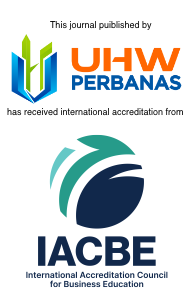Publication Ethics Policy
The Indonesian Accounting Review (TIAR) is committed to the COPE (Committee on Publication Ethics) Code of Conduct and Best Practice Guidelines and applies them across all stages of scholarly publishing. This policy applies to all manuscripts and materials published by TIAR. For ethical questions or concerns, contact: tiar@perbanas.ac.id.
- Scope and Definitions
- Publication ethics covers the behavior of authors, editors, reviewers, and the publisher.
- Key terms: correction (corrigendum/erratum), retraction, expression of concern, disclosure of conflicts of interest (COI), and duplication/dual submission.
- Roles and Responsibilities
2.1. Editor-in-Chief and Editors
- Final decision to publish/reject based on scientific merit, originality, clarity, relevance, and valid evidence, as well as applicable law (defamation, copyright infringement, plagiarism).
- Maintain manuscript confidentiality; do not use unpublished data for their own research.
- Do not handle manuscripts of their own, family, or same-institution colleagues; refer to an independent Editorial Board.
- Handle suspected misconduct fairly and evidence-based according to COPE flowcharts.
- Ensure a fair, non-discriminatory, and unbiased review process.
2.2. Reviewers
- Assist editors with objective, constructive, argument-based reviews.
- Maintain confidentiality; do not use information for personal gain.
- Declare Conflict of Interest and decline review if there is a conflict of interest or inadequate expertise.
- Identify relevant uncited work and suspected plagiarism/duplication.
2.3. Authors
- Present work honestly, clearly, accurately, and originally; without fabrication, falsification, or data manipulation.
- Ensure the manuscript has not been previously published and is not submitted to more than one journal simultaneously.
- Provide proper citations for all sources, ideas, data, and unique terms.
- Authorship reflects substantial contributions; other contributions are recorded in Acknowledgements.
- Disclose all relevant Conflict of Interests.
- Provide supporting data when requested and follow data availability policies.
2.4. Publisher/Journal Management
- Maintain the integrity of the scholarly record, editorial independence, and compliance with COPE.
- Maintain archiving systems and long-term content availability.
- Editorial Process and Peer Review
- Initial screening by the Editor-in-Chief for scope fit and ethical compliance.
- Double-blind peer review by at least two independent external reviewers.
- Reviewer selection based on expertise, track record, and freedom from Conflict of Interest.
- Reviewer guidelines provided to ensure ethical and unbiased reviews.
- Revisions and final decisions documented; right to appeal available with clear reasons.
- Confidentiality maintained for authors, reviewers, and manuscript content.
- Originality, Plagiarism, and Duplication
- Plagiarism in any form is unacceptable: verbatim copying without attribution, use of unique terms/concepts without acknowledgement, paraphrasing without citation, fake citations, fabricated data, obscuring authors’ contributions, and self-plagiarism/dual submission.
- TIAR uses similarity checks; findings are followed up per COPE flowcharts.
- Research Ethics on Humans and Animals
- Human research requires institutional ethics approval (where applicable) and informed consent from participants or legal representatives, even when data are anonymized.
- Authors state whether consent was written or oral; if oral, explain the reason and how it was recorded. If there is an exception/waiver, specify the granting body and rationale.
- Participants’ privacy and confidentiality must be protected; identities are not revealed without explicit permission.
- Animal research follows recognized animal welfare guidelines and relevant ethical approvals.
- Data, Availability, and Reproducibility
- Data, code, and materials underlying the conclusions should be reasonably available to other researchers, subject to privacy laws, ethics, and license agreements.
- Authors include a data availability statement and repository (if any).
- Conflicts of Interest (COI)
- All parties (authors, editors, reviewers) must disclose financial, professional, personal Conflict of Interests, organizational memberships, relationships with entities that may be perceived as relevant, or personal beliefs related to the topic.
- Disclosures are included in the manuscript under the Conflict of Interest Statement section.
- Use of Artificial Intelligence Technology
- Generative AI (e.g., ChatGPT) cannot be listed as an author. Authors bear full responsibility for content, including AI-generated parts.
- Use of AI is disclosed in the Acknowledgements (tools and purpose). Spellcheck/grammar tools and reference managers are exempt from specific disclosure requirements.
- Citation Policy and Reference Integrity
- Avoid citation manipulation (coercive citation, excessive self-citation, or irrelevant citations).
- All statements of fact and ideas not belonging to the authors must be cited accurately.
- Copyright, Licensing, and Preprints
- Copyright and license policies (including open access where applicable) are clearly stated to authors at submission.
- Authors must disclose if the manuscript or its version has been available as a preprint; TIAR may consider preprints according to journal policy.
- Corrections, Retractions, and Expressions of Concern
- Minor corrections (copyediting/typesetting) may be made without formal notice; substantial corrections follow COPE guidelines and receive a traceable public note.
- Retractions follow COPE Retraction Guidelines for serious errors, substantial plagiarism, unreliable data/findings, or content that endangers safety.
- An Expression of Concern may be published when there is preliminary evidence of misconduct but the investigation is not yet complete.
- Publishing malpractice (defamation, privacy violations, court orders, serious health risks) may result in online content removal with a notice of reasons.
- Handling Alleged Misconduct
- Reports may come from readers, reviewers, or institutions; TIAR follows up confidentially and fairly, referring to COPE flowcharts.
- Authors are given the opportunity to respond; if necessary, TIAR contacts the affiliated institution for investigation.
- Outcomes are addressed with corrections, retractions, or other appropriate actions.
- Complaints, Appeals, and Authorship Disputes
- An appeal mechanism is available for editorial decisions; authors must provide specific evidence/counterarguments.
- Complaints about the editorial process, behavior of editors/reviewers, or timelines are handled by the Editor-in-Chief or an independent representative.
- Authorship changes (addition, removal, order) after submission require written consent from all authors; disputes may be referred to institutions and follow COPE guidance.
- Confidentiality, Privacy, and Security
- Manuscripts are treated as confidential by editors, reviewers, and staff.
- Personal data are processed in accordance with applicable laws and privacy best practices.
- Editorial Independence, Advertising, and Sponsorship
- Editorial decisions are independent of commercial or sponsor interests.
- Advertising/sponsorship (if any) does not influence editorial decisions and is disclosed transparently.
- Archiving and Retention
- TIAR ensures long-term archiving of published content through reliable indexing/archiving systems.
- Sanctions
- For ethical violations: manuscript rejection, temporary submission bans, notification to institutions, corrections/retractions, or other actions proportional to the violation.
- Compliance Statement
- By submitting a manuscript to TIAR, authors declare that they have read, understood, and agreed to this ethics policy and the relevant COPE guidelines.
TIAR endorses the Code of Conduct and Best Practice Guidelines for Journal Editors published by COPE.
Publication Ethics Contact: tiar@perbanas.ac.id














